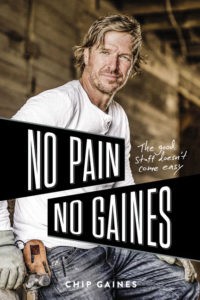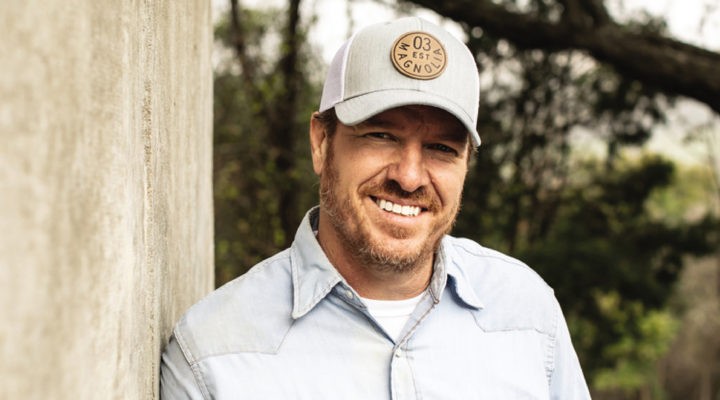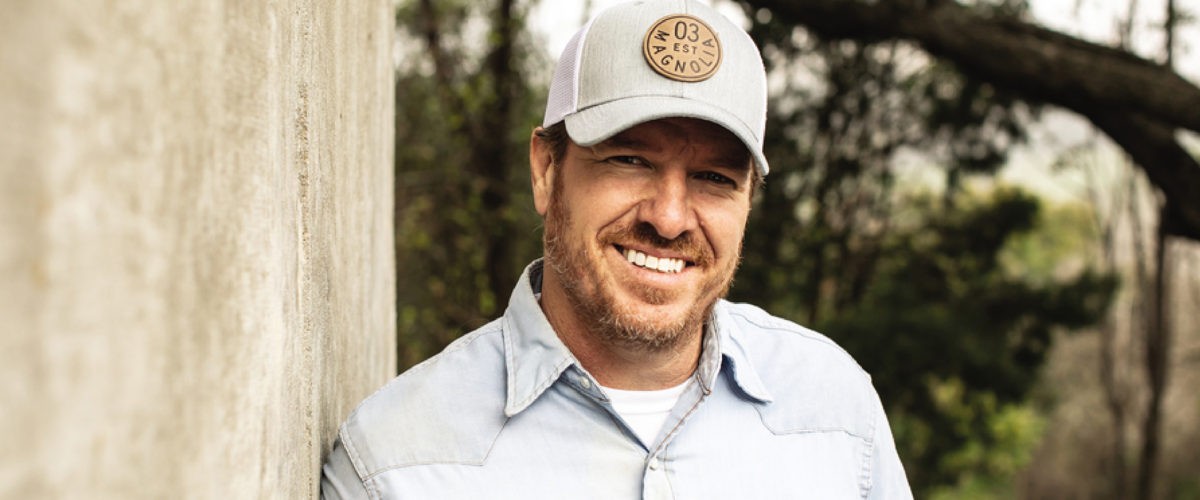Chip and Joanna Gaines have become household names in American reality TV and fixer-upper culture. In Chip’s new book, No Pain, No Gaines: The Good Stuff Doesn’t Come Easy, he makes it clear that the life that he and Joanna have carved out together has been anything but easy. Although this isn’t his first book, it is the first book he has written explaining the importance of finding and keeping a community of people around you that will help you achieve your life goals.
He recently gave an exclusive interview to BNG to talk about the book.
How does this book differ from your first book, Capital Gaines?
 I didn’t write this book as a sequel to Capital Gaines, but I can’t help but see how they’re related. Capital Gaines was my life in hindsight — a playbook of sorts of all the ways I’d chosen to do things differently, both in business and in my personal life, and how it paid off for better or worse.
I didn’t write this book as a sequel to Capital Gaines, but I can’t help but see how they’re related. Capital Gaines was my life in hindsight — a playbook of sorts of all the ways I’d chosen to do things differently, both in business and in my personal life, and how it paid off for better or worse.
And in a lot of ways, this book is about doing things differently too. Because yes, it’s a book about networks. But it’s not a book about networking. Not in the traditional sense anyway. It’s not about how to leverage your interactions with everyone you meet in an all-out sprint to get ahead.
It’s about how to find a group of real people who come through for you in good times and bad. People who remind you who you are and what you value and don’t let you settle for anything less. People who bet on each other instead of the status quo.
Building that kind of network, one that will pull you into a life of rich, authentic connection, requires doing things differently than the world tells us to. And it doesn’t come easy — the good stuff never does.
Not unlike your first book, the title of this one includes a play-on-words with your last name. What does the book titling process look like for you? What inspired this title?
It’s funny, I can’t even remember how we landed on the title for Capital Gaines. With this book though, it was actually the title that came to me first. At the time, Jo and I were launching into what might be the hardest work of our lives — building an actual television network — and one morning I had this realization that none of it would be possible without the network of people who have poured their lives into both of us and the work we’re doing. I told Jo, “I think I want to write a book about how we’ve built our network.”
I wanted to call it “Building a Network” — mainly because I’m a sucker for wordplay. But every time I started thinking about my own network of people and about the circumstance that bonded us, it certainly wasn’t any kind of “networking” event — you know, the type where you show up in your best suit and leave with a few new business cards and a couple more followers on your LinkedIn account.
“It requires faith in people. It requires hope and a willingness to grow even when it hurts.”
I knew from experience that the road to building connections that are strong and reliable, that have the potential to change the world, would require more effort than that. In fact, it requires a lot of very hard work. It requires faith in people. It requires hope and a willingness to grow even when it hurts. So, it wasn’t until the manuscript was nearly finished that I realized this book wasn’t just about “building a network.” It’s about what it takes to build a life of meaning, including relationships that run deep. And sure, building it will be painful, but what you’ll gain in the end is worth every bit of it.
“Doing things differently” is a consistent theme readers will find woven throughout the pages of this book. Do you think that approach to business has been one of the keys to your success? What do you think inspired that “do things differently” mentality of yours?
I always had the feeling that I was cut from a different cloth. Even at a young age my mom used to tell people I was going to be a preacher when I grew up and my dad would always add, “If he doesn’t end up in jail first!” I just had this feeling that there was something off when I looked around and saw everyone doing the same thing.
But then I grew to realize that’s what our culture teaches us — that conformity is our highest probability of success. Or, at the very least, the path of least resistance. And I probably would have grown to accept that the well-worn road was the only road after all if it hadn’t been for a handful of people in my life who showed me what it looked like to live life on their own terms, who weren’t interested in doing things the ordinary way. To me, those people were living an extraordinary life, and I always knew that’s what I wanted for myself.
“That’s what our culture teaches us — that conformity is our highest probability of success.”
What has experience taught you?
Now that I have a little more life under my belt, I can tell you that this approach has been the key to me failing at least as often as it has been the key to my success. Jo and I have certainly found ourselves on both ends of the spectrum. But it’s the way we’ve chosen to live our lives. It’s who we are, and we wouldn’t have it any other way.
At one point in the book, you write that you and Joanna have built your entire lives around the notion that “hard work yields great results, even when there’s little evidence of it.” Can you talk about some of the times in your life (with or without Joanna) where your hard work yielded great results despite having little to show for it?
When Jo and I were trying to get our renovation business off the ground, we were in this cycle of killing ourselves to fix up something that at times was uninhabitable, sell it for a little profit, and then have to start over again.
By no means were we bringing in large amounts of money, but we didn’t give up. We got better. Every day was on-the-job training. I was learning how to properly assess properties and what it meant to make a smart investment while Jo was figuring out her own way to make each place unique.
“All the grit and sweat equity we put in during those early years didn’t necessarily show up in our bank accounts, but none of it was without purpose.”
All the grit and sweat equity we put in during those early years didn’t necessarily show up in our bank accounts, but none of it was without purpose. Those years gave us our footing — the knowledge and experience that we’ve been putting to use for a couple decades now.
One of the most prominent parts of the book comes alive when discussing the difference between “network” the verb and “network” the noun. Can you tell us about your “network” and why that delineation (verb versus a noun) is so important to you?
When I had the idea to write a book about building a network, I shared the concept with a few people who assumed it would be about how to network, “network” the verb. How to go out into the world and meet powerful people who can turbocharge your career. But that’s not at all what I was after and not at all what you’ll find in this book.
How has having a network/community of people shaped you?
I’ve been building my network my whole life, and the people who are part of it wouldn’t tell you it’s because of what they could do for me or what I could do for them. They are folks who have simply had my back at least as often as I have had theirs, even when it looked inevitable that we were going to lose. People who, in moments when either one of us could have brushed the other off because it wasn’t convenient, chose not to. People who have leaned in instead of pulling apart and who have a sincere belief that relationships are more than transactions.
And what it has yielded over a lifetime is a network of people I trust and who trust me. Call it a community, a home team. By my definition, that’s your “network,” the noun, the group of people with beating hearts and passions who live and love and try and fail, and who are there beside you as you do the same.
”Too often we suppress our own inner voice because maybe what we want isn’t ‘wise,’ or ‘you can’t make a living at it.’”
If there’s one thing you hope readers take away from this book, what would it be?
We’ve all got something to offer this world, a purpose that’s ours alone. But too often we suppress our own inner voice because maybe what we want isn’t “wise,” or “you can’t make a living at it.” Or we get hung up on figuring out what our passions or purposes are in the first place and forget to ever get started.
I think society would have us believe that we have to be cutthroat to excel in business and in life, but I’ve learned to place my bets on a different theory: we’re stronger together. And what I hope this book does is remind us all that if we can surround ourselves with people who will amplify our purpose instead of muffling it, we can turn that inner whisper into a roar.
If you could give your 25-year-old-self one piece of entrepreneurial advice, what would it be?
When you focus only on “status,” you end up with the status quo.
Maina Mwaura is a freelance writer and communications consultant who lives in Atlanta.


